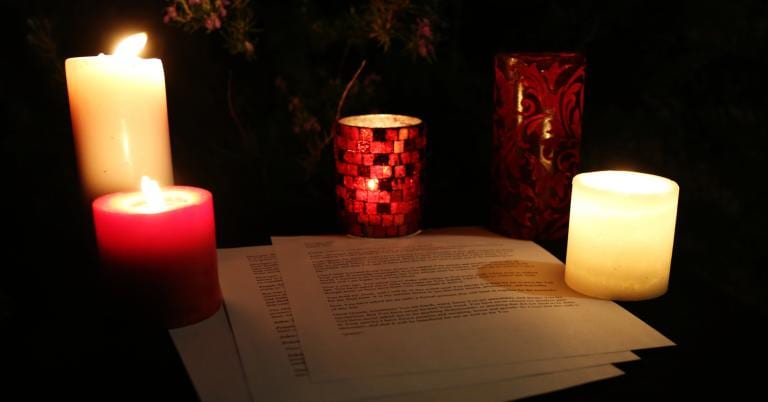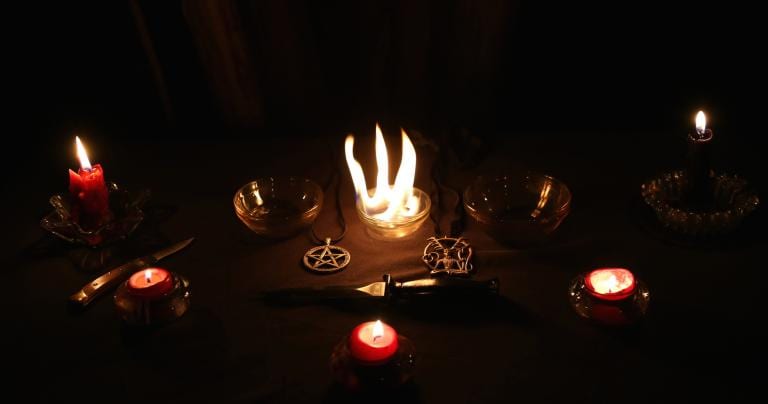I’ve written about oaths several times over the years, but I recently got a question I haven’t addressed before. Erin asked:
I’ve been called to take a formal oath to The Morrigan. She’s clear that this is a formalization of our existing relationship, and She and I have been negotiating our agreement. I was wondering if you have any suggestions of how to go about a formal oathtaking.
Not everyone is called to take an oath to a deity. And for those who are, there’s no one right way to do it. I’ve done it three times – the first two were slightly different and the third was very different. Based on my experiences – including experiences of facilitating and witnessing oaths made by others – this is my suggested approach.
Understand exactly what you’re getting into
Do you take an oath or do you make an oath? This website says there’s a slight semantic difference of interest to Christians who believe their religion forbids swearing oaths, but for the rest of us there’s no difference. Taking or making, an oath is a solemn promise to do – or to not do – certain things in certain ways in certain contexts.
Make sure you know exactly what you’re promising.
If you’re contemplating taking an oath to a deity – or to anyone else – I suggest you read these three blog posts.
Why Would Anyone Take an Oath to a God?
6 Reasons You Shouldn’t Swear an Oath to a God (and 3 Reasons You Should)
You may want to read them twice, just to be sure you get it – it’s that important. But today’s post assumes you’ve already done that, so I’ll summarize them in one sentence: do not promise what you cannot do, or what you will not do.
You’re unlikely to be struck by lightning if you break an oath, but there will be consequences. You don’t have to swear an oath (unless you do) so if you aren’t absolutely sure it’s what you want to do and what you will do, don’t do it.
Negotiate the oath
What are you being asked to do? Serve your deity forever? We are immortal and forever is a very long time – you might want to limit that to “for the rest of this ordinary life.” Or maybe not even that long – how about “for the next five calendar years and then we’ll renegotiate”?
Read Negotiating With the Gods from 2017. It was written specifically in this context. Get clarity on what you’re being asked to do. If it doesn’t sound good to you, make a counteroffer. There’s no guarantee your counter will be accepted, but you’ll never know if you don’t ask.
What’s in it for you? In some cases, simply being in close communion with a God and being a part of Their work is enough to make it worthwhile – it was (and is) for me. But if there’s something you want – especially if it’s something you feel like you need in order to do what you’re being asked to do – don’t be afraid to ask for it.
When the negotiations are complete, put the oath in writing. You can hand-write it in calligraphy on fancy paper or you can type it into a Word document and print it out in Times New Roman. The Gods’ memories may be perfect but yours isn’t – write it down.
Have it reviewed by a priest, a lawyer, and a diviner
An oath is essentially a contract. There’s a reason why human contracts are so long and use such odd language – they try to be extremely precise about what is being agreed to under all possible circumstances. The Gods are virtuous, but “that’s not what I had in mind” isn’t going to cut it if that’s what you promised to do.
Ideally your oath will be reviewed by three people. The first is a priest of the God you’re swearing the oath to. This is someone with some familiarity with the deity, who has an idea of what They want and how various clauses might be interpreted.
The second is a lawyer – someone who’s used to reading contracts. If you can’t find a lawyer you trust to understand a polytheist oath, an engineer or a programmer is the next best thing. They’re used to reading and writing detailed specifications, and thinking of all the different ways they might play out.
The third is a diviner. Even if you’re good at divining for yourself, have someone else read cards or runes or bones and see what they can see. You need an objective opinion before you make a sacred commitment.
If any of these people tell you there’s a problem with your oath, re-negotiate it before you take it. Afterwards is too late.
Create a ritual for taking the oath
Now we get to the core of Erin’s question. This can be a large formal ritual, or it can be something you do on your own. There is no one right way. But an oath to a God is a big deal, and it deserves some ceremony.
This isn’t worship. There’s no need to go through your entire liturgy. But some sacred theatre is helpful.
This is a good time for pre-ritual cleansing – maybe a ritual bath, or at least changing clothes. Spend some time in meditation and contemplation – get your mind in the right place before you begin.
Set an altar, light candles, go through some sort of formal opening. A ritual procession helps emphasize that you’re beginning a journey. It doesn’t have to be a long procession – from your back door to an altar set up in your back yard, or even down the hall and into your bedroom can be enough.
Invite witnesses
While you don’t have to have witnesses, it’s good to share important occasions with your friends and allies. And having witnesses aids in accountability – if you’re lucky your human friends will remind you that you aren’t keeping your oath before a God decides you’re an oath breaker.
Not all witnesses are among the living – you may want to invite your ancestors and other spiritual allies to be a part of the ceremony. Use discretion – your grandmother who was a devout Baptist may not appreciate you swearing an oath to a Pagan God.
Invite the Deity of the Occasion
Since They asked you for an oath, presumably They’re going to be there. Still, it’s polite to formally invite Them into the ritual space. And if you invite Them in, you probably should make hospitality offerings. This isn’t worship, but offerings are one way we show proper respect for the Gods.
You may want or need to have someone act as proxy for the Deity of the Occasion. When I took my oath to the Morrigan, I asked a friend who is Her sworn priest to officiate, and to accept the oath on Her behalf. There was no proxy when I took my oath to Cernunnos.
Take the oath – say the words
This is why you came here – this is the whole purpose of the ritual.
Write the words beforehand, then read the words you wrote – the words you negotiated. Unless your oath is very short, don’t try to memorize it. If you slip up and say the wrong words, will you be held to the spoken words or to the written words – or to both? Just read them. The Gods are virtuous and honorable but many will consider your sloppy mistakes to be your problem, not Theirs.
The Fair Folk will consider them to be your problem, but you shouldn’t swear an oath to the Fair Folk… unless you have to…
Leave room for a response
An oath is a contract and must be agreed to by both parties. If you’ve negotiated the oath beforehand this should be a formality, but it’s a formality that should be observed.
What form will the response take ? There may be a sign in Nature. You may need to take an omen – draw a rune or a card for confirmation. The officiant may hear directly from Them, especially if they have a priestly connection. Or you may hear that same voice that called you to take the oath saying “I accept your promise.”
I’ve never had an oath rejected – either my own or one I was facilitating – but it is a possibility. If it happens, figure out what’s wrong and fix it.
Seal the oath
Sealing the oath is a way of saying “it’s done.” There are many ways to do this, including literally sealing it with wax and a signet. You can seal it with your blood. I generally don’t recommend using blood in rituals, but I’ve done it. You can offer it to the fire – now it’s committed fully to the world of spirit. There are many other ways to finalize the oath – pick what seems right for this occasion.
If you keep the paper, put it some place safe. You may want your officiant to keep it for you. It is a sacred document and should be treated with respect.
Say goodbye
As with ordinary rituals, when you’re done say farewell to everyone you invited in – including the Deity of the Occasion. Say some closing words – perhaps a formal benediction, or perhaps something as simple as “this ritual of oathtaking is now complete.”
Do what you said you’d do
The ritual may be over, but the oath lasts forever – or at least, for as long as you agreed to abide by it. And the time to start fulfulling it is now.
Even with a strong and honored oath, a relationship with a deity will still wax and wane. You aren’t Their only concern, and They aren’t yours. There are things I do every day, others I do every week, and others I do every season. And then there are the big things that come when they come, projects and assignments that were either explicitly a part of my oaths, or that were implied by them.
Oaths are sacred commitments that should never be taken lightly or carelessly. But my oaths have helped my relationships grow stronger and deeper, and that makes my life better. I pray that your oaths will do the same for you.



















